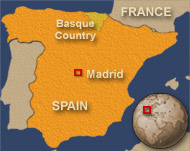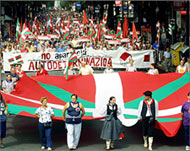Basque storm at Spanish film festival
Politics and sport are never far from the surface in Spain, and the 51st San Sebastian International Film Festival is no exception.

About 160 films are showing at the event which opened on Thursday and will run to September 27.
But none is likely to court more controversy than Julio Medem’s 115-minute offering Basque Pelota, the Skin against the Stone. The film is due to be shown at the Festival on Sunday.
Pelota is a game in which the players strike a ball with their hands within a walled court.
But storm clouds are brewing about the work, which owes rather more to intense political debate, Basque-style, than sport.
Controversy
After a private showing of the film, professor Gotzone Mora and journalist and writer Inaki Ezquerra, both of Basque origin and interviewed in the movie, accused Medem of “manipulating Spanish history” and of “exalting nationalism”.
 |
|
More than 800 people have died |
They believe the film glorifies violence and is sympathetic towards the armed Basque separatist group ETA, which has killed more than 800 people in a three-decade struggle for independence in the Basque region of northern Spain.
Medem retorted by saying he would “not respond to the criticisms until the showing” of the film.
He left it to viewers to “work out my true intentions”.
‘Invitation to dialogue’
Those intentions, he maintains, are bringing to the screen a film which is an “invitation to dialogue” based on a rejection of violence.
Festival organisers have allowed the film into the line-up saying that they do not see the work as an “vindication for terrorism”.
|
“(The film) lacks objectivity and constitutes a manipulation of history” Gotzone Mora, |
Publicity material for the media attending the event says that Medem’s film “analyses the situation in the Basque country in honest and dispassionate fashion, posing questions about the past, present and future of Euskal Herria (Basque for the Basque country.)
“In presenting a large number of interviews with Basques, much archive material and a superb soundtrack (Medem) offers a documentary which will leave nobody indifferent,” says the PR spiel.
‘Biased and offensive’
But Mora and Ezquerra remain far from convinced.
They have branded the film as “biased and offensive for those under threat (of ETA violence). It furthermore portrays the police as torturers.”
Mora and Ezquerra added they were horrified by the film’s release for showing at the Festival.
 |
|
Basque nationalist protest: The |
“It is a biased film which presents the Spanish state as the enemy of the Basque country, the Spanish Civil War (of 1936-39) as a war between Spain and the Basque country and the (Spanish) constitution and monarchy as being imposed upon the Basque people.
“It lacks respect for the victims (of the violence),” added Mora, referring to those who had died since ETA began its armed struggle in 1968.
Legal threat
In an interview with Friday’s ABC daily, Mora accused Medem of “having planned a documentary as a justification of violence,” saying the film “lacks objectivity and constitutes a manipulation of history.”
Mora and Ezquerra have threatened to sue the producers if the movie is released with their interviews included.
Spanish Interior Minister Angel Acebes reacted to the controversy by saying that “nobody is alien to the struggle against terrorism.”
He added that anyone who believed in democratic values should not provide even “minimal” succour to ETA.
However, Oskar Matute of the hard left Basque EB-IU coalition in the Basque autonomous parliament spoke out in favour of the film, accusing opponents of its showing as “trying to curtail freedom of expression.”